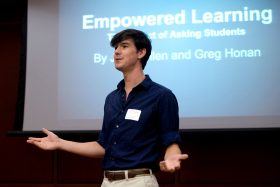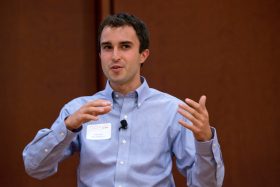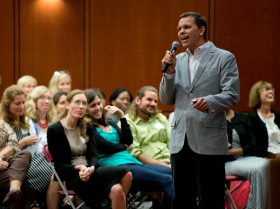The daylong program in the Koury Business Center was attended by hundreds of educators from across the region.

[/caption]More than 300 university and college educators representing almost three dozen institutions attended the Teaching & Learning Conference at Elon University on Thursday in a program co-sponsored by the Center for the Advancement of Teaching & Learning (CATL) and Teaching & Learning Technologies (TLT).
With a theme of “Student Engagement: the View from their Seats,” the 11th annual conference included workshops – many led by Elon faculty and staff – that explored ways to better connect with and empower students.
“I’m hoping [attendees] left the conference with at least a couple of practical ideas for things they can put into place within the next semester,” said Deandra Little, managing director of CATL and associate professor of English, who added that many of the strategies conference-goers discussed about “effective teaching and student learning are carefully thought-out, tried and repeated lessons learned by faculty and educators from all over.”
David Green, director of the Center for Faculty Development at Seattle University, delivered the conference’s opening plenary. Titled “Front Row Seats: Lifting the Veil on Faculty Preconceptions of Undergraduates,” the session challenged educators to counteract the preconceived notions about students that they bring into the classroom.
“We all have preconceptions of our students,” Green said. “The important thing to remember is that most of those preconceptions are going to be wrong.”
Green presented the results of a study that compared faculty members’ preconceptions with data from more than a thousand of their own undergraduates. His findings were met with occasional murmurs from attendees as certain preconceptions about students, their behaviors and their backgrounds were shown to have been proven untrue.
“If you can try and become conscious of what those preconceptions are … you’ll start to notice different things,” he said. “‘Am I doing this?’ ‘Why am I doing that?’ If we can keep asking those questions, it helps us bring our preconceptions to the forefront … and think of strategies that will help us counteract those preconceptions in the brain.”
The goal for every professor, Green says, should be to create “the most just environment for your students that you possibly can so they can reach their potential.”

[/caption]
A host of workshops and “lunch and learn” sessions followed Green’s plenary. The Aug. 14, 2014, conference culminated with two TED-style talks – one offered by a pair of recent Elon alumni and another by Tony Crider, an associate professor of physics at Elon.
Greg Honan and Jared Allen, who graduated from Elon in 2014, called their talk “Empowered Learning: the Impact of Asking Students.” They discussed the learning technique called “threshold concepts” and told the story of an interdisciplinary seminar they’d taken at Elon that featured candid conversation between students and a faculty member outside of the classroom, often over a meal.
The duo said students taking part in the seminar felt like “co-investigators of an interesting question” and found it to be a powerful thinking and learning experience.
“This was a really exciting supplement to classroom learning,” Allen said, while urging the assembled educators to take into account students’ ideas as they design courses and expectations.

[/caption]“The student perspective is critical in determining methods for teaching and learning,” he said.
“Students want to be asked about teaching and learning,” Honan echoed, saying that if instructors ask students to provide input, “I can guarantee that students will say ‘yes.’”
In his talk, called “Experiential Education on the Edge: Searching for the Classroom of the Future and Ending Up in the Past,” Crider began by discussing his childhood fondness for “Star Trek,” and how a classroom occasionally featured on the program captured his imagination.
“I wanted to build that classroom,” Crider said, while openly considering what a learning environment from hundreds of years in the future might look like. He then shared with the audience three different methods of creating “experiential education” for students.

[/caption]Crider called the first “Reacting to the Past,” and described it as a role-playing game series developed for history classes that is now used in many disciplines. He noted examples of how competition drove students to better know course material.
He also detailed a series of activities developed for an interdisciplinary, team-taught honors class on the search for extra-terrestrial intelligence. The activities were designed to have students both apply the assigned reading and to experience the exhilaration and frustration of astronomers doing research in this area.
The third concept Crider shared is the replacement of a final exam with an “Epic Finale” that has students demonstrate their understanding of a topic rather than merely asking them to silently answer questions about it on a piece of paper. Allen, who was in an astronomy class Crider taught, recalled the course’s epic finale as one of his most-memorable learning experiences in college.
The daylong Teaching & Learning Conference took place in Elon’s Koury Business Center.


